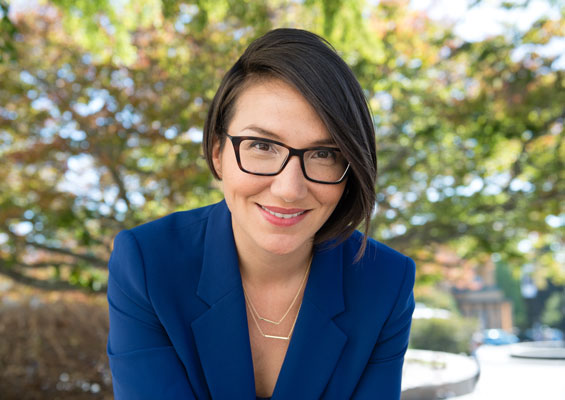
Jane Alston
MBA 19
General Surgeon
U.S. Air Force
Jane Alston, recently left active duty as a general surgeon with the U.S. Air Force, and has found her work in medicine and the military to be complementary. “Effective leadership in both requires a systematic approach to problems as well as a degree of resourcefulness,” she says. “I think this is also true in business.”
Building strength on the business side of health care
My long-term goal was hospital administration, but I targeted the health technology entrepreneurial space, because it allowed me to “learn by doing” across all aspects of the business right from the start, learning about a company’s life cycle and helping guide it through various operational, financial, and strategic obstacles.
As a physician, I saw many of my colleagues left frustrated when decisions about clinical care were made by those who have never practiced medicine. I hoped to bridge this gap by learning both sides of the coin.
I was confident an MBA would teach me about the business side of medicine and hone my managerial skills, so that I could be a more effective leader in the future. I was also excited to gain exposure to the entrepreneurial side of health technology through the Haas network.
I felt very fortunate to be in the Bay Area as it gave me limitless access to various startups and accelerators focused on healthcare. There were so many opportunities for me to break out of my clinical silo and gain valuable skills within these nimble companies on the strategic and operational side of business. These experiences proved invaluable to me in a future large scale endeavors such as hospital administration.
A diverse and tightly-knit community
I went to one of the Berkeley Haas classroom visits, and in addition to enjoying the class immensely, I was struck by how tightly knit the student body was. They were truly a community, not just classmates.
Haas did an excellent job of recruiting a diverse student body that represented a wealth of industries and professional experiences, and this showed in the many different ways students approached problems. My background in medicine allowed me to contribute a different perspective on biomedical cases, which are often written from the pharmaceutical or device company’s point of view.
While I learned about the financial and strategic intricacies of making these go/no-go decisions about product launch, I approached these cases as a physician first. This means I often had a keen focus on risks versus benefits to a potential patient population.
Balancing active duty with business school
In my experience, Haas went above and beyond to accommodate me as a military applicant, and then as an active duty student; they allowed me to apply and interview remotely while deployed in Afghanistan. I was also granted special permission to conduct independent study one quarter when I had a last minute tasking to Turkey last year, so I still stayed on track to graduate on time.
I also found UC Berkeley’s Veteran Services Office to be extremely responsive and always on top of things which makes using my benefits much easier.
Strengthening team and leadership skills
BerkeleyHaas was not just about classroom learning, it was about learning from my classmates. Medical school was a lot of independent study; you studied and tested alone. At Haas, it was primarily group work so you learned how to be a more effective team member, which was just as important as being an effective team leader.
I had a better understanding of team dynamics and how to utilize each teammate’s capabilities to the fullest. At Haas, I developed as a team player and as a leader.
I initially had some concerns that pursuing an MBA would pull my focus away from medicine, but I actually felt like the intellectual curiosity fostered at Haas made me a more vigorous “student always” in both realms.
Learning from our excellent faculty members also recharged and inspired me as an educator to our surgical residents and medical students. The concepts I learned in electives like Power and Politics made me a more effective communicator, team member and leader on the wards and in the operating room.
PREVIOUS DEGREE
BS, Chemistry
College of William and Mary
Williamsburg, Virginia
MD
University of Pittsburgh
Pittsburgh, Pennysylvania
